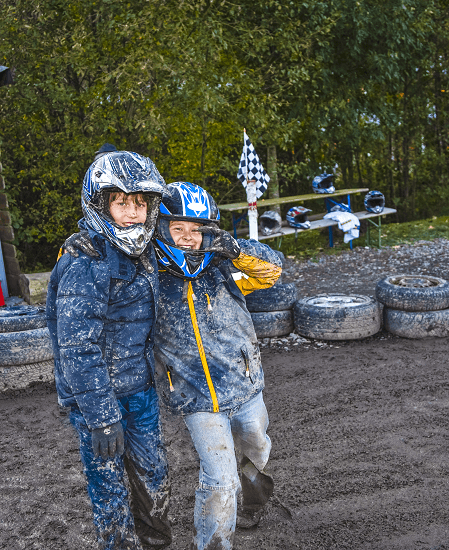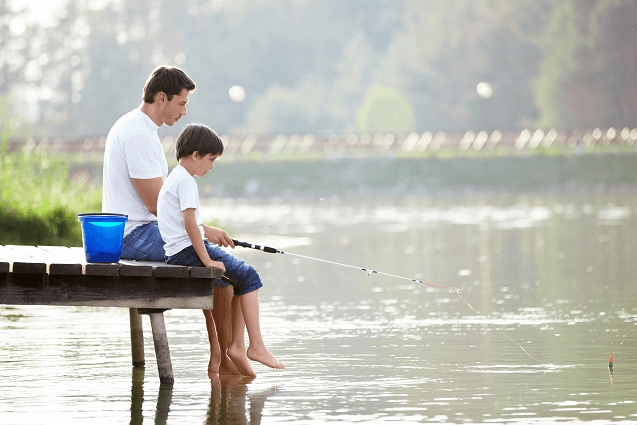Albert Einstein is considered one of the greatest geniuses of all time, though rumor has it he failed high school calculus. As you might imagine, this is an exaggeration ‒ Einstein didn’t remember getting anything but A’s.
It’s possible that this story had something to do with his math skills. Despite his amazing intellect, Einstein wasn’t as strong in math as many of the other physicists of his day. Throughout his life, he was known to have frequently said, “If I could just do the math.”
At the age of 76, Einstein passed away. On the table next to him were a pen and pad on which he was working through math equations.
The greatest genius of his day ‒ and arguably in history ‒ understood that life is a process. Until the day he died, Einstein lived in a state of growth and self-development.
We’re all born with certain skills, but the mindsets we have toward improving our skills and character ultimately determine our success in life.
The legendary boxer Joe Louis once said, “Championships aren’t won in the ring. That’s just where they are crowned; they’re won in the dark halls of the training room early in the morning when nobody is watching.”
Einstein’s theories were the crowning achievements of his life. But they were the product of years of focus and personal growth that happened behind the curtain.
In her groundbreaking work, Mindset, Carol Dweck presents the “growth mindset” as the most essential element of success and happiness in life. A growth mindset is a perspective on life in which we find validation from internal growth rather than external rewards:
Who we become is what we take forward forever.
How do we instill a growth mindset in our children and students? The key is in how we frame success, and the language we use to do so. It doesn’t require doing more, just an adjustment to how we already do things.
Here are 6 strategies to support a growth mindset at home and in the classroom:
Support intrinsic pride ‒ As parents and educators, we like to validate our kids. Personally, I love to tell my son that I’m proud of him. I feel good, he feels good, and it’ s a win-win… or is it?
Here’s a simple suggestion on taking this validation to the next level and fostering a growth mindset. Rather than saying “I’m proud of you,” try saying, “You should be proud of yourself.” You’ll each experience that great feeling inside, but you’ve delivered a powerful message that validation should come from within. This reinforces the child to look inward rather than outward for appreciation and acceptance.
It’s about being and becoming, not having and getting ‒ We teach to help our students grow, and when they have successes, it is important to we acknowledge them.
There is a simple strategy for recognizing individuals from a growth mindsetperspective. Rather than emphasizing the good grade or award, recognize the achievement by celebrating the person they had to become to get it. Ask them to reflect on the work they did, the obstacles they overcame, and the new capabilities they developed.
When you focus on the effort involved rather than the result, your students understand the value of the process that yields success.
Celebrate failure ‒ As students grow older, they become less inclined to answer questions in class or participate in discussion. In kindergarten, you can’t stop them! But by high school, it can be like pulling teeth.
 Often, this is because they have been conditioned to fear the sense of failure that comes from being wrong. For teachers, this can make for a pretty lonely classroom.
Often, this is because they have been conditioned to fear the sense of failure that comes from being wrong. For teachers, this can make for a pretty lonely classroom.
Here’s a tip to help reinvigorate discussions and further emphasize growth: When a student answers a question incorrectly in class, genuinely celebrate it. You might say, “Not quite, but kudos for trying. Life rewards people who take risks, so keep it up!” Parents can try this in their day to day interactions with their kids as well.
The key is to help young people build confidence in trying, so they’re less concerned about the negative consequences of making mistakes. When you help with this, you create the valuable understanding that taking risks, participating, and making mistakes are not only positive things, but critical ingredients to success.
Debunk the talent myth ‒ Calvin Coolidge once said, “The world is full of unsuccessful men with talent.” One indicator of a fixed mindset ‒ the antithesis of a growth mindset ‒ is the belief that our abilities and intellectual capacities are defined at birth.
In fairly recent medical history, science defined the concept of neuroplasticity or brain plasticity. Essentially, our brains are like plastic, and have an incredible capacity to change and evolve based on our experiences.
In a nutshell, we have enormous potential to develop ourselves much more than we ever believed possible.
Share this concept with your students! Use stories of individuals who overcame obstacles and labels to develop extraordinary talents and capabilities. Help them understand that the work they put into the process of school or life will greatly impact what they achieve and who they’ll become.
Talent will always be trumped by effort and a growth mindset. Learning this will motivate academically and athletically challenged students to maintain high expectations for their lives. It can also be a wake-up call for students who’ve leaned on their natural intellects for years and may have never developed the capacity to work hard or overcome adversity.
Start anew ‒ One of the most powerful things we do with our kids and students is guide them through the process of forgiving themselves.
So many young people are labeled as bad students or as having behavior problems. It is so ingrained in their minds that this is who they are, and so they feel powerless to be anything else.
Early on in your relationship with your students, let them know that your partnership begins today. Their lives are about who they want to become and not who they were, and within them is the ability to create a new future on their own terms… a process that starts now. They are not products of the past, and their futures are not predetermined. Agree that you’ll dismiss any preconceived notions, and ask them to do the same.
Communicate that your belief is that everyone is capable of great things, and you’re asking them to share in that belief and apply it to themselves.
Share your own growth ‒ Students often view us only as teachers or parents. Help them see you as an individual, and that where you are in life is a culmination of all the actions you’ve taken and decisions you’ve made. There is so much power in your stories, and you can unlock it by sharing the challenges and struggles of your life… the difficult decisions and failures as well as the successes.
Our research tells us that these shared stories can have a lasting impact on the lives of kids—often the ones you least expect to affect. So find opportunities to share your stories! You never know how critical those moments might be in making a difference.
I remember a story about legendary basketball coach John Wooden. His secret to success was recognizing that everything in life is a process. Short cuts can’t be taken, and certain things must always be done. The first day of practice every year, the first thing he’d teach his players is how to put their socks on and lace up their shoes. It was daily growth that started on day one and enabled him to build extraordinary championship teams.
The little things add up to major significance in life. Imagine if your goal each day wasn’t to win or lose, pass or fail, but just to be a little better than you were yesterday. Imagine being validated not by getting the question right, but by learning how to solve new types of problems. Imagine valuing yourself not based on single moments in time, but on who you’re becoming.
Now imagine instilling this thinking in our children and students. We could help decrease youth anxiety and depression, increase self-esteem, improve grades, and positively affect the frequency of behavior issues. And our schools could become what we all want them to be… places of true learning.
No one truly has a 100% growth mindset, and no one can make the switch overnight. However, we can do little things each day to remind our kids to look inward for validation, appreciate the little improvements, and become growth-oriented in their thinking. After all, we don’t want them to just go through life… we want them to grow through life!




